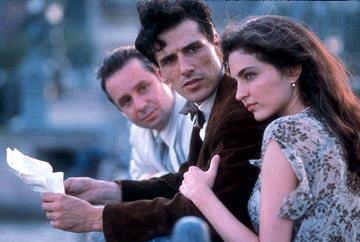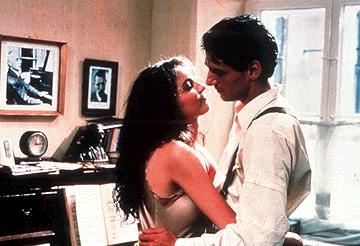Gloomy Sunday
(Ein Lied von Liebe und Tod)


In 1933, Hungarian Rezso Seress wrote a haunting song entitled "Gloomy Sunday." Legend has it that the power of the song was so strong that people committed suicide after listening to it. Gloomy Sunday is a reimagining of the origins behind the song, based on the novel by Nick Barkow. Director/adapter Rolf Schubel (Der Indianer, Bier Fur Lama Kara). Not surprisingly, the story behind the song is about a woman. And what a woman she is. Erika Marozsan (Vienna, The Crusader) plays Ilona, the gorgeous hostess of Laszlo's, a small restaurant in Budapest. The food is great, but people also go there to gaze upon Ilona. Schubel chose well, and it is easy to see why Ilona is the object of the lust and affection of every male patron.
Marozsan is absolutely stunning. She has flawless skin and striking blue eyes that peek out from her dark brown hair. The lucky man in her life is Laszlo (Joachim Krol, The Princess and the Warrior, Run Lola Run), the owner. They have been together for a couple years, and are extremely happy. They are still happy when Laszlo hires Andras (Stefano Dionisi, Sleepless, Il Prezzo), a handsome young man, to play piano in his restaurant. Ilona falls for him, and oddly enough, Laszlo is okay with it. And so is Andras. The three become a sort of extended family. Laszlo's rationale is that he would rather share Ilona than lose her completely, and Andras agrees. Each represents something different; Laszlo is stability and intellect, while Andras is art and passion, and Ilona cannot choose between the two.
Andras writes "Gloomy Sunday," and it becomes an instant hit. When people start committing suicide, it brings a sense of notoriety to Laszlo's. The song and the restaurant keep getting more popular. Then, Schubel and co-writer Ruth Toma (Solino, Kebab Connection) shift gears. World War II begins to intrude upon the trio. Hans Weick, (Ben Becker, Sass, As White as in Snow), an old admirer of Ilona's, returns to Budapest. He is one of the Nazi's in charge of moving Jews out of the city, which greatly troubles Laszlo, who is Jewish. However, once Laszlo saved Hans, and Hans claims to have Laszlo's best interests at heart. The characterization of Hans is so shallow that it's blatantly obvious that he's the bad guy, and will eventually renege on his word.
This whole latter portion of the film detracts from a thoughtful, almost melancholy first part. Laszlo and Andras are both so happy, yet profoundly sad. Worse, the two are friends. They each want Ilona, but also do not want her to come between their friendship. Krol personifies this. Schubel has many shots of him, gazing at Ilona and Andras. He is smiling, but his eyes betray his real feelings. Gloomy Sunday, up to this point, is like a fairy tale, but before Schubel can end it, he begins a different movie, one that is not necessarily worse, just different. The reintroduction of Hans changes the entire tone. Reality intrudes into the myth, as the film takes on the harsher topics of anti-Semitism. Budapest and Laszlo's are idylllic little places to eat, listen to music, and have fun, only to have something ugly destroy everything.